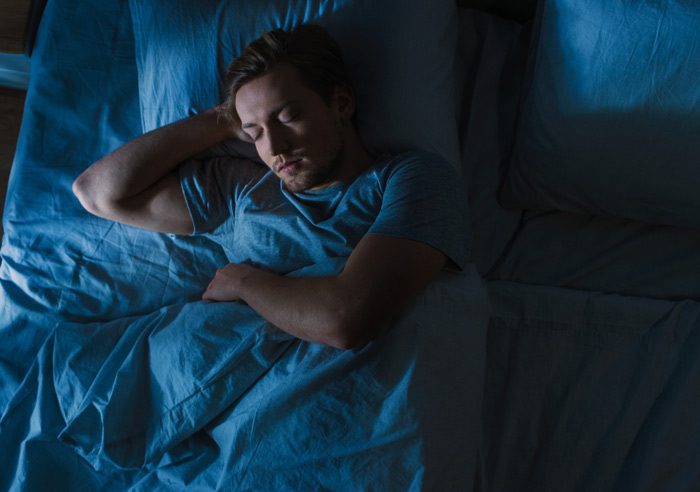Tips for Good Sleep Hygiene in Recovery
What Is Sleep Hygiene?
 Sleep hygiene is a term used to refer to a series of habits that promote a more restful sleep. Since insomnia and other sleep difficulties are common in the early stages of recovery, it’s important to be aware of the changes you can make to support your sleep health.
Sleep hygiene is a term used to refer to a series of habits that promote a more restful sleep. Since insomnia and other sleep difficulties are common in the early stages of recovery, it’s important to be aware of the changes you can make to support your sleep health.
Create a Consistent Sleep Schedule
It’s not necessarily a problem if you like to sleep in or go to bed late. However, you should create a consistent sleep routine where you are going to bed and getting up at approximately the same time each day. If you need to wake up at 7:00 AM during the week to go to work and you sleep until 3:00 PM on the weekend, you’re sending your body mixed signals.
Ideally, there should be no more than one hour difference between your weekday and weekend sleep schedule. If you’re sleeping well, your body will naturally keep to this level of consistency.
Avoid Daytime Naps
When it’s hard to sleep at night, you may be tempted to make up for your sleep deficit by napping during the day. However, this can leave you trapped in a cycle that worsens your sleep difficulties.
If you must nap, it’s best to do it before 3:00 PM and keep it short. According to the Mayo Clinic, a nap of 10 to 20 minutes is ideal for boosting energy levels without causing nighttime sleep difficulties.
Create a Relaxing Sleep Environment
Your bedroom should be quiet, dark, and calming. Some tips to create a soothing space for sleep include:
- Clear out excess clutter.
- Invest in curtains to block out excess light.
- Buy a small fan to circulate air and block out noise.
- Treat yourself to more comfortable bedding and a quality mattress.
- Decorate in soothing colors such as soft blue, beige, and pale green.
- Use scented candles or essential oils to create a calming atmosphere.
- If you tend to anxiously watch the clock when you can’t fall asleep, turn your clock so it’s facing away from you.
- If you have pets, move their toys and bedding to another room so they’re not waking you in the middle of the night.
Avoid Large Meals Before Bedtime
Eat your last meal of the day two to three hours before you go to bed. Going to bed before your body has had a chance to digest your food can lead to troubles with heartburn and acid reflux.
If you are hungry before bed, choose a low-calorie and nutrient-dense snack. A cup of yogurt or a handful of almonds can help you ward off hunger without disturbing your sleep. Tart cherries are an even better choice because they contain natural melatonin, a hormone that can regulate sleep.
Cut Back on Caffeine
It’s fine to have a cup of coffee or two when you first wake up, but cut out caffeine in the afternoon and evening hours if you’re having problems sleeping. Too much caffeine can leave you feeling jittery and anxious—especially if you suffer from co-occurring anxiety or depression. Overdoing caffeine can be a leading factor in poor sleep hygiene.
Remember that caffeine can hide in unexpected places. Hot chocolate, pain medication such as Excedrin, energy waters, protein bars, and certain dietary supplements are examples of often overlooked sources of caffeine that can cause sleep difficulties.
Schedule Exercise for Earlier in the Day
Physical activity helps promote a more restful slumber, but exercising too close to bedtime can backfire by making it harder to fall asleep. It’s better to schedule your workouts for the morning or early afternoon hours.
Strive to get at least 30 minutes of exercise per day. When possible, try to exercise outdoors. Exposure to natural light can help reset your body’s internal clock, and promote good sleep hygiene.
Turn Off Electronic Devices
When you’re having trouble sleeping, it’s a good idea to keep your cell phone, laptop, and television out of your bedroom. Electronic devices are overly stimulating when they are used too close to bedtime.
Instead of falling asleep while watching TV or scrolling on your phone, it’s a better idea to read, write in your journal, or go through a quick series of yoga stretches. Try to create a nighttime routine that will help you relax.
Stay Away From Sleeping Pills
The idea of a “quick fix” for sleep problems is alluring, but even over-the-counter sleep remedies can have harmful side effects. Sleep medications can also carry a risk of addiction—and you don’t want to jeopardize the progress you’ve already made in your recovery. Do not take any sleep medication without consulting your healthcare provider.
Waypoint Is Always Ready to Help
At Waypoint Recovery Center, we’re committed to helping clients at our South Carolina drug and alcohol addiction treatment program develop the wellness-focused habits necessary for lasting sobriety. If you are struggling with sleep difficulties, we will work with you to create a safe and effective treatment program that will allow you to continue moving forward with your recovery journey.




